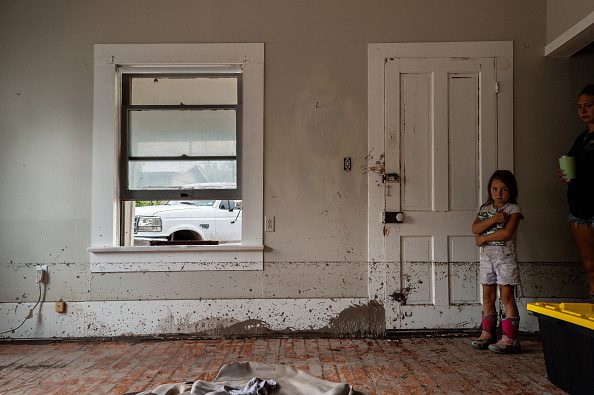
Ayzlin Garcia in her aunt’s home in Center Point after it was flooded on July 6. (Photo by Brandon Bell/Getty Images)
The Texas Hill Country floods heavily impacted children. Experts warn the emotional toll will last far beyond the disaster for them.
The floodwaters in Central Texas that killed more than 130 people have receded, but the emotional impact of the disaster on children is just beginning.
For hundreds of children attending summer camps, the Fourth of July weekend turned into a desperate fight for survival. At Camp Mystic, over two-dozen campers died and more than 700 girls were evacuated.
“Just by opening the conversation, parents are getting their first glimpse into how their children are responding to information,” said Karin Price, chief of psychology at Texas Children’s Hospital. “Which then gives them the opportunity to correct any misinformation or to clear up any misconceptions their children might have.”
The Texas Hill Country floods killed more than 130 people, with nearly 100 fatalities concentrated in Kerr County, which is home to Camp Mystic.
For children, the emotional repercussions, whether they directly experienced the natural disaster or observed it from a distance, continue to intensify. Price noted that children’s reactions vary, often including emotional withdrawal, anxiety, sadness, and trauma-related nightmares.
“Seeing reactions such as sadness, anxiety, avoidance, reliving the trauma in terms of nightmares are all very common in children who have experienced or witnessed a trauma,” Price explained.
Studies from the National Institutes of Health and the National Center for PTSD showed that youth exposed to disasters—whether directly or through media—are significantly more vulnerable to post-traumatic stress, emotional instability, and survivor’s guilt.
“We know that a minority of children really will carry this with them and they will experience more prolonged anxiety, depression or trauma reactions and those are the kids that we worry about,” Price said.
On Friday, Gov. Greg Abbott launched the Texas Flooding Emotional Support Line, managed by the Texas Health and Human Services Commission. This free statewide service offers crisis counseling to people affected by the floods.
“This new statewide crisis support line will ensure survivors, families, and first responders have access to emotional support and crisis counseling as they work to heal and recover,” Abbott said.
Here are ways people can help those impacted by the flooding.
Mental health resources for people impacted by Texas Hill Country floods
Texas Flooding Emotional Support Line
833-812-2480
Texas Children’s Hospital
Pediatric psychiatry appointments: 832-822-1900
Existing patients: 832-822-3750
Hill Country MHDD Centers
Crisis hotline: 877-466-0660
819 Water St, Suite 300, Kerrville
830-792-3300
NAMI Texas
830-377-9940
Email: [email protected]
P.O. Box 294168, Kerrville
Harris Center for Mental Health and IDD
Crisis line: 713-970-7000
United Ways of Texas
Dial 2-1-1
Services: Connects to food, shelter, healthcare, and counseling
MHMR of Tarrant County iCare
817-335-3022
3800 Hulen St., Fort Worth
1300 Circle Drive #104, Fort Worth
Mental Health America of Greater Dallas
214-871-2420
2824 Swiss Ave. #3, Dallas
Child & Family Guidance Center
214-351-3490
8915 Harry Hines Blvd., Dallas





















